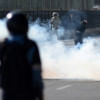Imran Khan’s arrest has cracked open Pakistan’s compromised politics

With former Prime Minister Imran Khan's arrest, Pakistan's powerful military - which has long been acknowledged to "manage" the political scene from behind the curtains - now finds its supremacy in tatters. On Thursday, the Supreme Court of Pakistan called for an immediate release of the former cricket captain and ex-PM and declared his arrest illegal - in what has been called the fastest case of post-arrest bail in the nation's entire legal history.
For now, the decision from the top court has doubled down the pressure on the Army that used the NAB and paramilitary forces to arrest the recalcitrant Imran Khan, whose popularity with the masses has proved menacing for the current government.
Though the Supreme Court's backing marks a win for the former cricketer-turned-politician, his troubles are far from over. Even though he got a two-week bail in the Al-Qadir trust case, there are other cases in which he can be arrested. He would still have to face the charges, and could still be convicted. Many of Khan's senior colleagues in the Pakistan Tehreek-e-Insaf (PTI) still remain arrested.
What happens next will determine who wins in what has been a hate-love, ugly fight for power and control between the army and their 2018 leader of choice. But for now, it's clear that Imran Khan, unlike his predecessors, will not fade away so easily; shaking the wall of military-compromised politics will be remembered as one of Imran Khan's most significant political achievements. The Supreme Court's decision reaffirms that and so does the nationwide unrest that followed his arrest.
Khan's supporters have targeted and vandalised historically off-limits army premises in surreal demonstrations; the group that ransacked Lahore Corps Commander's residence and stole peacocks to "claim their rightful share," is first of its kind in the nation. As covered widely, pro-Khan supporters have been chiming, "kaha tha na Imran Khan ko mat chhed na" ("We had warned you not to disturb Imran Khan").
To add to the mayhem, there are allegations of rifts within the army itself, with members who struggle to accept Imran Khan's nemesis, Gen Asim Munir, as chief. Some of the protesters around GHQ on Wednesday were reportedly family members of serving officers of the colonel and brigadier ranks.
The gestation period of the current stalemate started a while back, when the relationship between the ex-PM and the military turned sour. It's a rule of thumb in Pakistan's political playbook: to stay in power, you need the endorsement of the army. During his term, Imran Khan did what the military wanted, from backing Beijing belt road, chastising the West, to extending the term of Gen Qamar Bajwa, the chief of the country's army, by three more years in January 2020.
Then once he was ousted in April 2022, Khan became the military's biggest critic, alleging Gen Bajwa wanted him killed. If Khan and his supporters have a shared quality with the powers that be, it's their unstoppable determination to win.
Khan has emerged as a messianic cult personality, appealing to the youth. Pakistan is a young nation, with over 64 percent of the population under the age of 30. If elections were to be held, polls, even as recent as March this year, strongly suggested he and his party, PTI, would win.
His support is unfaltering; his party still controls Punjab, Khyber Pakhtunkhwa, and Gilgit-Baltistan. The army's new man, Nawaz Sharif's brother Shehbaz Sharif, has not been able to come near that image. The battle between the military and Imran Khan gained steam, bereft of a suitable figure to counter the ex-PM.
Khan has been roaring on social media, barnstorming livestreams, painting himself as the honest messiah of the whole pack. His evergreen charismatic persona has proved more than sufficient to make masses forget his not-so-successful tenure as Prime Minister – and the fact that Khan is hardly a man of his word.
He's played double games, taken u-turns on multiple occasions and issues, from his stance on the US and India. But none of that matters to his die-hard supporters who see him as a prophet. With an imploding fuel crisis and sky-high unemployment, civilians appeal to the anti-establishment song that Khan sings (though hypocritically, as he, too, was once a beneficiary of the establishment).
The game was destined to reach this fate. Not only was Khan struggling under the threat of the army, but the latter was also finding it increasingly difficult to contain him. Two months ago, the police had tried arresting the former cricket captain in front of his house, but it was his supporters who prevented it. Khan did not back down; neither did those he went up against. Taking him away from the public eye was the only way to stop him and bringing him back will cement that the military has accepted defeat. So it is safe to assume that in the next few days, we'll see more shadowy efforts to repress Imran Khan.
If Imran Khan is convicted in the near future, the concerns hovering over the country are the likelihood of an irreversible meltdown. There are practically no good outcomes for either side now, unless Khan and the military negotiate and find a compromise for the next elections. But for each day that this stubborn political war drags out, Pakistan, on the brink of a sovereign default, will continue to bleed.
Ramisa Rob is a journalist at The Daily Star.

 For all latest news, follow The Daily Star's Google News channel.
For all latest news, follow The Daily Star's Google News channel. 








Comments